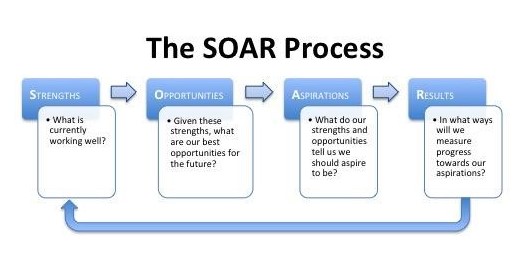Jan 7, 2019

Why do 60 to 80 percent of organizational change efforts fail?[1] Most fail because they do not engage those most impacted by the change and therefore do not generate the energy needed to create the change desired. The practice of Appreciative Inquiry encourages us to: “Imagine an organization where there is a shared vision, and everyone helped create the plan to move towards that vision.”
Global Learning Partners Certified Dialogue Education Teacher (CDET), Jay Ekleberry, has guided numerous organizations through a powerful, Appreciative Inquiry-based SOAR (Strengths, Opportunities, Aspirations, Results) process. Through this process, an organization employs a variety of methods and connects with as many stakeholders as possible to:
- identify current strengths,
- name ways to build on those strengths, and
- co-author, with its community, how those strengths and opportunities inform what the organization should aspire to be.

The shared accountability and commitment created during the process provides the energy needed for the change effort to have impact after the process.?
This dialogue-based process has been proven successful across a wide range of both for-profit as well as social-benefit organizations, large and small. One inspiring case study of the Thinking Forward Together process comes from the Wisconsin Union. Through the process, the Union worked closely with the broader community to define a strengths-based vision for their future and create results measures that they renew annually.
Recently, The River Food Pantry completed a SOAR process that included development of new succinct statement of their Mission (what we do), Vision (what we reach for), and Values (what motivates us). Using an appreciative and inclusive approach, the team named aspirations and goals for each aspect of their priority work together.
Data now confirms what we knew intuitively: positive emotions resulting from a focus on strengths can promote an upward spiral toward optimal individual and organizational performance.[1]?
There are a variety of ways to engage in the SOAR action research process, from a one-day summit to an extended, multi-month data gathering effort. Each organization needs to decide for itself what will work best given its context.
Two things that make the SOAR process work for any organization are:
- Scalability- Appreciative Inquiry, and the SOAR process, have proven to be scalable to any size organization, having been successfully applied to small staff local community programs up to immense human systems like the US Navy and the Canadian national healthcare system.
- Approach- Every SOAR process should be customized for the human system using it – this is not a one-model-fits-all process. One of the axioms of Appreciative Inquiry is “as many people at the table as possible.” SOAR is best accomplished when an organization commits to learning the principles of the process and conducts the inquiry while creating a variety of engagement methods throughout the process.
Who do you know that can benefit from this sort of process?
* * * * *
Jay Ekleberry has been a Certified Dialogue Education Teacher (CDET) with GLP for many years. Recently, Jay completed his tenure at University of Wisconsin, Madison, where he guided the Division of Social Education’s organizational development processes, assisted in student leadership training and directed a variety of non-credit programs. He is the co-creator of a two-day course “Introduction to Appreciative Inquiry” that he has facilitated for many groups over the last decade. The course (of course!) is grounded in principles and practices of dialogue-based learning as taught by GLP.
For more insights into guiding such an approach in your organization, or to inquire about support for that process from Jay, email him at jay.ekleberry@wisc.edu .
[1] Journal of Change Management, 12/2011, Volume 11.4



